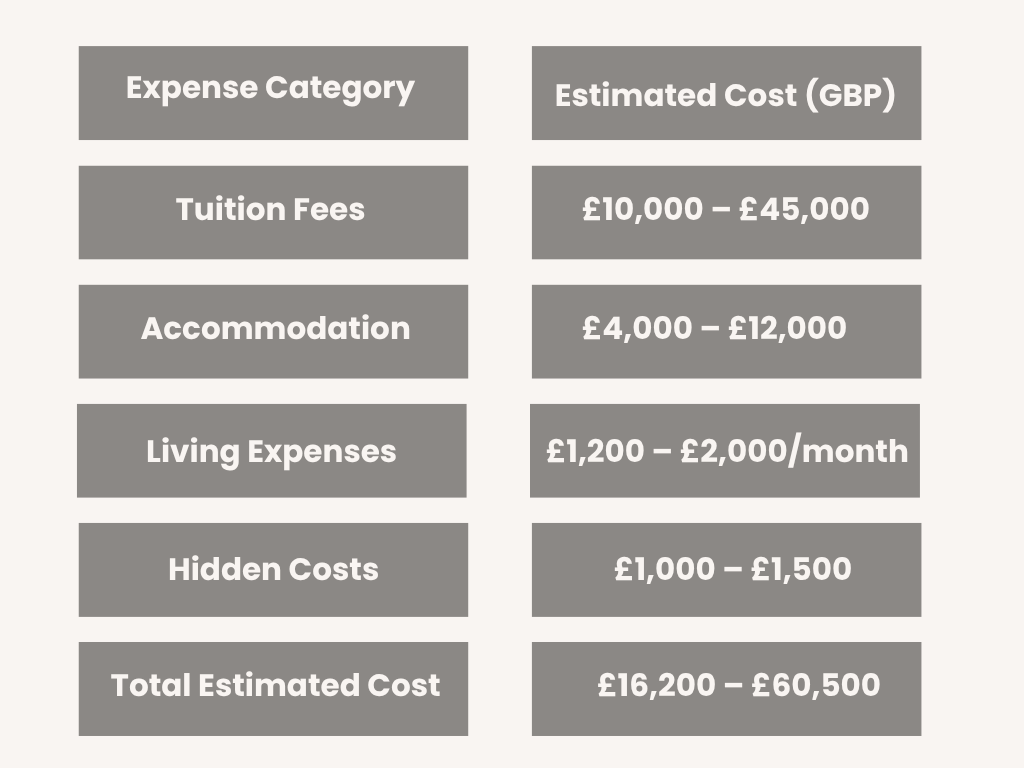The UK has long been one of the top destinations for international students, attracting learners from across the globe with its world-class universities, rich cultural heritage, and diverse career opportunities.
From the historic halls of Oxford and Cambridge to the vibrant campuses of London, Manchester, and Edinburgh, the UK offers an education experience that combines academic excellence with personal growth.
Cost of Studying in UK. Tuition fees, living expenses, and additional costs can vary widely depending on the course, city, and lifestyle choices.
Being informed about the full financial commitment not only helps in planning your budget effectively but also ensures you can focus on your studies without unexpected financial stress.
With accurate information, you can make strategic decisions about scholarships, part-time work, and other funding options.
Planning ahead and knowing the Cost of Studying in UK is essential for a smooth and enriching study abroad experience. For guidance and support in navigating your UK education journey, you can rely on experts like Genius Study Abroad.
Read More : UK Post-Study Work Visa 2026: PSW Updates for International Students
Tuition Fees: What to Expect

Understanding tuition fees is a major part of calculating the Cost of Studying in UK. Fees can vary significantly depending on the level of study, university, and field of specialization.
Undergraduate Courses: On average, international students can expect to pay between £10,000 and £38,000 per year.
For example, arts and humanities courses are generally on the lower end, while science and business-related degrees tend to cost more.
Postgraduate Courses: Tuition fees for master’s programs typically range from £12,000 to £45,000 per year. Programs such as MBA, Law, or specialized engineering courses often fall on the higher end of this spectrum.
Specialized Fields: Certain professional courses, especially Medicine, Engineering, and MBA programs, can exceed standard tuition ranges due to the intensive curriculum, advanced facilities, and global recognition.
For instance, medical degrees in the UK may cost upwards of £40,000 per year at top universities.
Knowing these figures helps students budget effectively and explore scholarship opportunities. Factoring tuition into your overall financial plan is critical when calculating the Cost of Studying in UK.
For tailored advice and support in selecting affordable yet high-quality programs, Genius Study Abroad can guide you through the process.
Read More : Study in UK 2026: Best Universities, Courses & Fees
Accommodation Costs
Accommodation is a significant part of the Cost of Studying in UK, and expenses vary depending on the type of housing and location.
On-Campus Housing: Staying in university-managed halls or dormitories usually costs between £4,000 and £7,000 per year.
On-campus options often include utilities, internet, and other amenities, making them convenient for first-time international students.
Private Rentals: Choosing private apartments or shared houses can range from £7,000 to £12,000 per year, depending on the size, facilities, and proximity to campus.
While private rentals offer more independence, students should also factor in bills, council tax (if applicable), and internet.
London vs. Other Regions: Accommodation in London is significantly more expensive than in other UK cities.
For example, a one-bedroom flat in central London can cost over £1,500 per month, whereas cities like Manchester, Birmingham, or Glasgow typically charge £500–£800 per month.
Budgeting wisely and considering shared accommodations or university halls outside city centers can help manage costs.
Careful planning of living expenses ensures you can comfortably cover your stay without affecting your studies.
Factoring accommodation along with tuition is essential when estimating the total Cost of Studying in UK. For practical tips, financial planning, and personalized advice, Genius Study Abroad can help students make informed decisions.
Read More : Top Scholarships in UK for Indian Students 2026
Living Expenses: Monthly Breakdown

In addition to tuition and accommodation, day-to-day living costs form a major part of the Cost of Studying in UK. Understanding these expenses helps students budget realistically and avoid surprises.
Food: On average, students spend between £100 and £250 per month on groceries and occasional dining out.
Cooking at home can significantly reduce costs, while eating out frequently in cities like London may push expenses toward the higher end.
Transport: Monthly travel expenses range from £40 to £100, depending on whether you rely on public transport or choose to cycle or walk. Many students benefit from discounted rail or bus passes offered by universities.
Utilities & Miscellaneous: Utilities, internet, mobile bills, and other essentials typically cost £100 to £200 per month. Students in shared housing can split bills, reducing individual expenses.
When combined with tuition and accommodation, living costs make up a substantial portion of the Cost of Studying in UK.
Proper planning ensures that students can enjoy their time abroad without financial stress. For practical budgeting strategies, part-time work options, and city-specific cost insights, Genius Study Abroad provides expert guidance.
Read More : UK Student Visa fee 2026: Latest Rules, Requirements & Application Guide
Hidden Costs to Consider
Beyond tuition, accommodation, and monthly living expenses, several additional costs contribute to the overall Cost of Studying in UK. Planning for these “hidden” expenses ensures a smoother, stress-free study abroad experience.
Visa Application: International students applying for a UK student visa must budget around £490 for the application fee. This is a mandatory cost for securing your study permit.
Immigration Health Surcharge (IHS): The IHS grants access to the UK’s National Health Service (NHS) and costs £624 per year. It’s important to include this in your financial planning, as it covers healthcare during your stay.
Study Materials: Books, lab equipment, software, and other study resources can range from £100 to £300 per year, depending on the course. STEM and art programs often require additional materials or specialized software.
Emergency Fund: Setting aside £200 to £300 for unexpected situations such as medical emergencies, travel, or urgent personal needs is highly recommended. Having a buffer fund reduces stress and ensures preparedness for unforeseen circumstances.
Factoring in these hidden costs is essential to calculate the real Cost of Studying in UK accurately.
With careful planning and expert guidance from Genius Study Abroad, students can confidently manage their finances and focus on making the most of their UK education experience.
Read More : 1-Year Master in UK for International Students 2025
Financial Aid & Scholarships
While the Cost of Studying in UK can seem high, there are several ways for international students to reduce their financial burden through scholarships, grants, and part-time work.
Chevening Scholarships: These prestigious scholarships are fully funded, covering tuition fees, living expenses, travel, and more for eligible students.
They are highly competitive but offer a significant opportunity to study in the UK without financial stress.
University-Specific Scholarships: Many UK universities offer scholarships tailored to international students, which can vary from partial tuition fee waivers to full funding.
For example, the University of Edinburgh, University of Manchester, and King’s College London provide merit-based awards that help offset costs significantly.
Part-Time Work: International students on a student visa can work up to 20 hours per week during term time and full-time during holidays. Part-time jobs in retail, hospitality, or on-campus positions can contribute toward living expenses, helping manage the overall Cost of Studying in UK.
By combining scholarships, financial aid, and part-time work, students can make UK education more affordable and financially manageable.
For expert advice on finding the right scholarships and planning your budget, Genius Study Abroad can guide you through the entire process.
Read More : Best UK Education Consultants in India – Genius Study Abroad
Sample Budget for One Year
To give a clear picture of the Cost of Studying in UK, here’s an estimated budget for one year based on typical expenses for international students

This breakdown highlights how costs can vary widely depending on the city, university, and lifestyle choices.
For instance, studying in London or pursuing specialized courses like Medicine or MBA can push the total closer to the higher end. Conversely, smaller cities or part-time work can help manage expenses effectively.
Planning a detailed budget before applying ensures that students are financially prepared and can focus fully on their academic journey.
For personalized budgeting advice, course recommendations, and scholarship guidance, Genius Study Abroad is the go-to resource for students aiming to study in the UK.
Read More : Best Consultancy in India for Abroad Studies | Top Study Abroad Experts 2025
Cost Comparison: London vs. Other Cities
Location plays a major role in the Cost of Studying in UK, with London consistently ranking as the most expensive city for students.
London: Living in the capital comes with a premium. Accommodation can cost £10,000 to £15,000 per year, while monthly living expenses may reach £1,200–£2,000.
Students can manage costs by sharing apartments, using public transport passes, or cooking at home instead of eating out frequently.
Despite higher costs, London offers unparalleled networking opportunities, internships, and cultural experiences.
Other Cities: Cities like Manchester, Edinburgh, Glasgow, and Birmingham provide more affordable options.
Accommodation typically ranges from £4,000 to £8,000 per year, and monthly expenses are generally lower than in London. These cities still offer high-quality universities, vibrant student communities, and ample part-time work opportunities.
Choosing the right city significantly impacts the overall Cost of Studying in UK, so students should weigh lifestyle preferences, career opportunities, and financial feasibility when making their decision.
For tailored advice on city selection and budgeting, Genius Study Abroad can help you plan efficiently and make the most of your UK study experience.
Read More : Super Early Bird Discounts for University of Hertfordshire UK 2025
Tips to Reduce Expenses
Managing the Cost of Studying in UK effectively can make your study abroad experience more affordable and stress-free. Here are practical tips to help students save without compromising their lifestyle or studies:
Accommodation: Opt for shared housing or university dorms instead of private rentals. Sharing an apartment can significantly reduce rent and utility bills while also offering a chance to meet fellow students.
Food: Cooking at home and shopping at budget supermarkets like Lidl, Aldi, or local markets can help cut monthly food expenses. Preparing meals in bulk and avoiding frequent dining out can save hundreds of pounds each year.
Transport: Take advantage of student discounts, railcards, and travel passes for buses and trains. Many cities offer special student passes that reduce commuting costs, making daily travel much more affordable.
Other Tips: Limit unnecessary spending on entertainment, consider second-hand books, and explore part-time work options to supplement living costs.
Implementing these strategies can noticeably reduce the overall Cost of Studying in UK while still enjoying a fulfilling student life. For more personalized budgeting tips and guidance, Genius Study Abroad can provide expert support tailored to your needs.
Read More : Top 5 Study Abroad Consultants in Delhi
Conclusion
Studying in the UK is an exciting opportunity, but it comes with a significant financial commitment.
From tuition fees and accommodation to living expenses and hidden costs like visa fees and health surcharges, the Cost of Studying in UK can range widely depending on the city, course, and lifestyle choices.
Careful planning and budgeting are essential to make the most of your study abroad experience. Exploring scholarships, part-time work, and cost-saving strategies can help manage expenses without compromising on education quality or personal growth.
By understanding the full financial picture and preparing accordingly, students can focus on academic success and cultural immersion rather than financial stress.
For expert guidance on budgeting, scholarships, and selecting the right university in the UK, Genius Study Abroad is here to support you every step of the way.
Contact No : 70 335 335 70
Read More : 10 Highest Paying Part Time Jobs in The UK 2025
FAQs
1. What is the average cost of studying in the UK?
The average annual Cost of Studying in UK ranges from £16,200 to £60,500, depending on your chosen course, accommodation, lifestyle, and city.
2.Can international students work part-time in the UK?
Yes, students on a UK student visa can work up to 20 hours per week during term time and full-time during holidays, which can help manage living expenses.
3. Are there scholarships available for international students?
Absolutely! Numerous scholarships, including Chevening Scholarships and university-specific awards, can cover tuition, living costs, or both, reducing the overall Cost of Studying in UK.
4. How much should I budget for accommodation?
Accommodation costs vary widely: £4,000–£7,000 per year for on-campus housing and £7,000–£12,000 per year for private rentals, with London being the most expensive.



